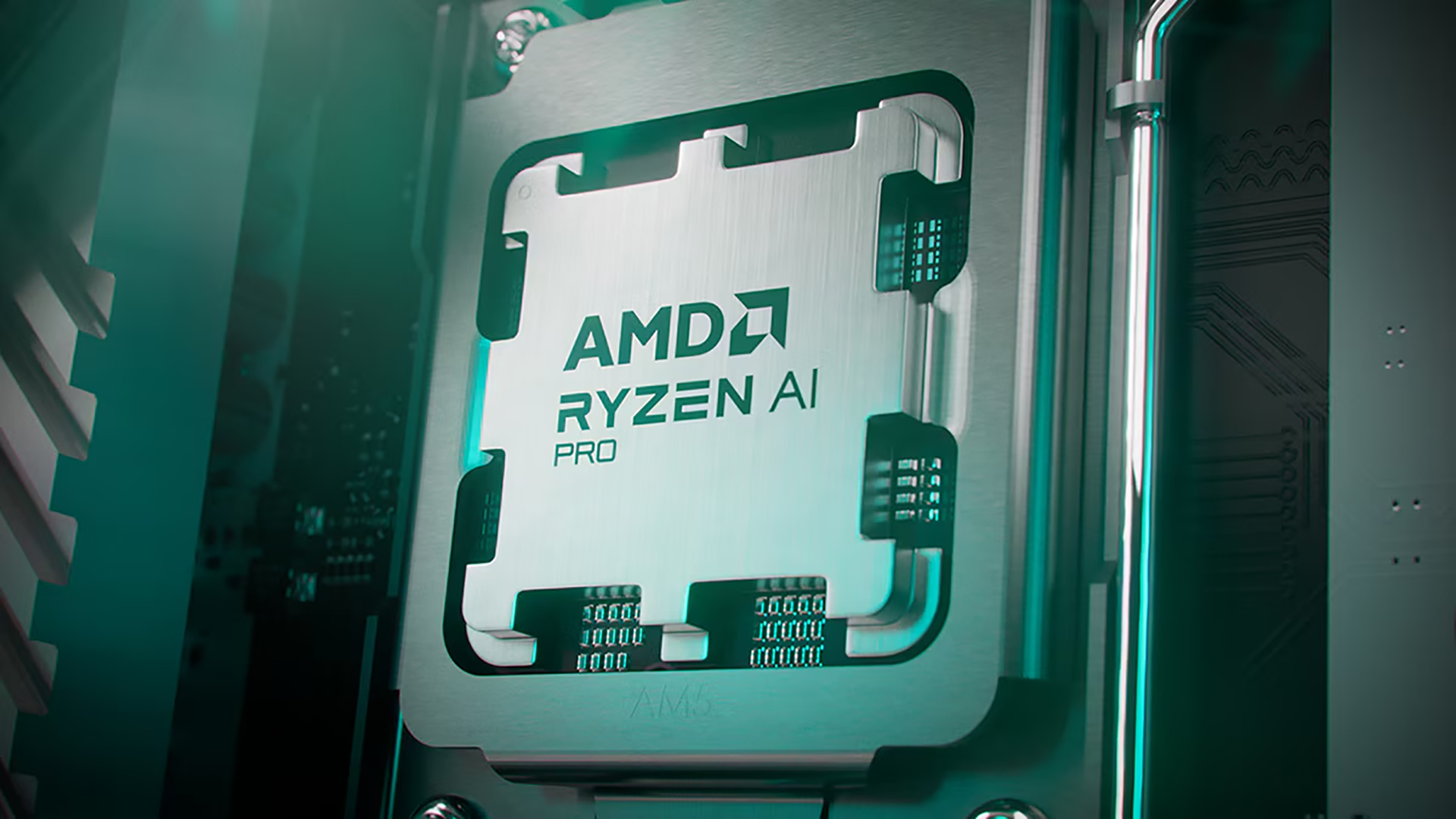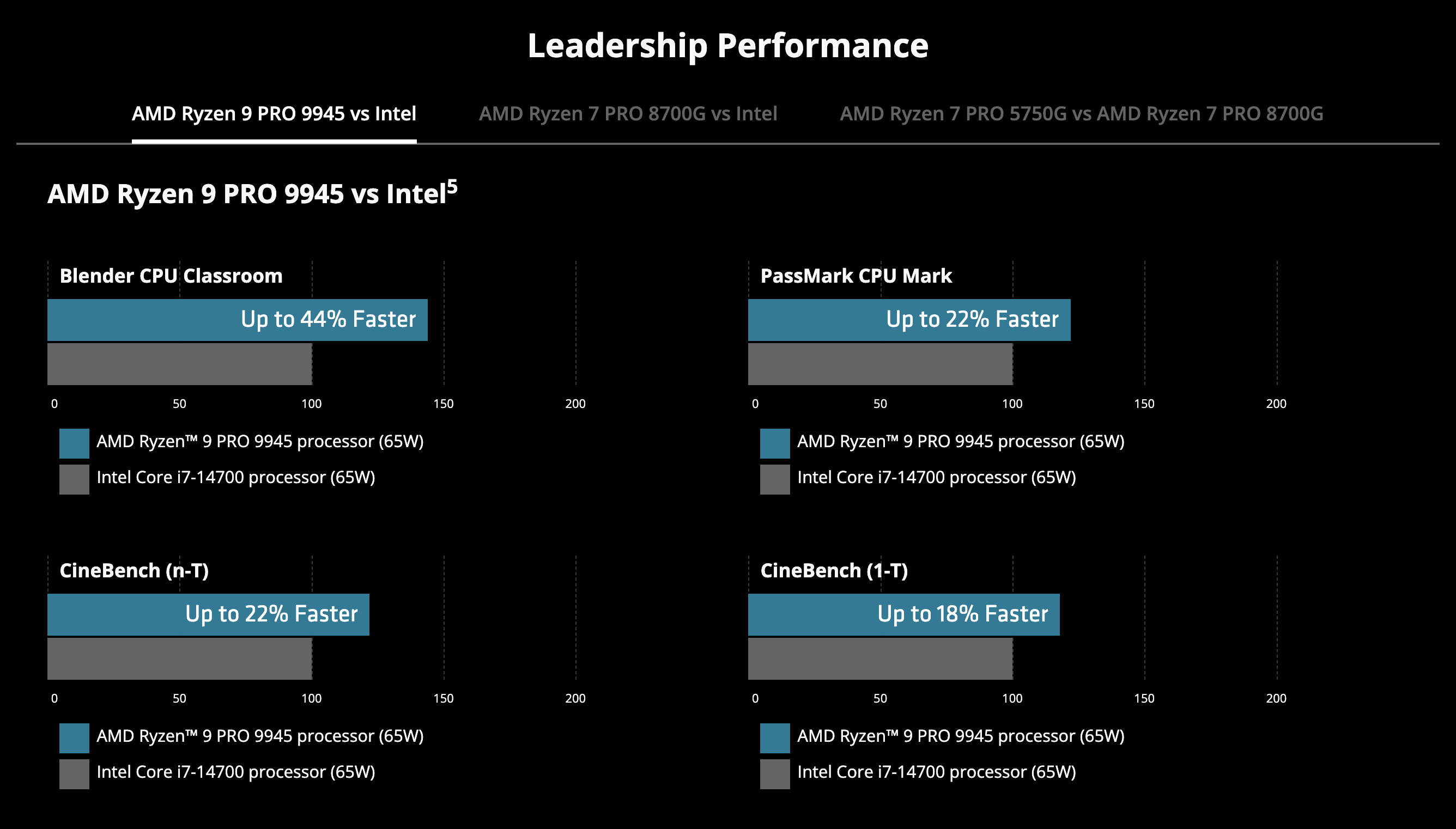AMD launches Ryzen 9000 PRO series, flagship model tops out at 12 cores — new enterprise lineup includes 3 CPUs for OEMs featuring added business and security features
Pricing and availability still up in the air.

Get Tom's Hardware's best news and in-depth reviews, straight to your inbox.
You are now subscribed
Your newsletter sign-up was successful
AMD released a bunch of new Zen 3, Zen 4, and Zen 5 processors yesterday, refreshing both existing and older families of CPUs. During this time, the company also silently launched its new enterprise lineup: Ryzen PRO 9000. These include three new SKUs built on the same Zen 5 "Granite Ridge" architecture as the mainline Ryzen 9000 series, but they feature cut-down silicon in favor of enterprise management and security features not present on standard CPUs.
First up, we have the Ryzen 5 Pro 9645. It comes with 6 cores and 12 threads, clocked at 3.9 GHz with boost speeds up to 5.4 GHz. Then there's the Ryzen 7 Pro 9745 with 8 cores and 16 threads, featuring the same 5.4 GHz boost clock but a slightly reduced 3.8 GHz base clock. The final model is the Ryzen 9 Pro 9945, which only has 12 cores and 24 threads, clocked at 3.4 GHz and boosting up to 5.4 GHz. Cache levels also remain unaltered in comparison to analogous Ryzen 9000 models.
SKU | Core Count | Base Clock / Boost Clock | Cache | TDP |
|---|---|---|---|---|
Ryzen 9 PRO 9945 | 12C / 24T | 3.4 GHz / Up to 5.4 GHz | 76 MB | 65W |
Ryzen 7 PRO 9745 | 8C / 16T | 3.8 GHz / Up to 5.4 GHz | 40 MB | 65W |
Ryzen 5 PRO 9645 | 6C / 12T | 3.9 GHz / Up to 5.4 GHz | 38 MB | 65W |
All three SKUs share the same 65W TDP, despite the standard Ryzen 9 9900X — which the Pro 9945 would be based on — featuring a 120W TDP. But it makes sense given there are 4 fewer cores on the Pro 9945. There are consistent base and boost clock gains over the previous generation Ryzen PRO 7000 series, like a 300 MHz boost clock increase on the Ryzen 5 Pro SKUs. However, the Ryzen Pro 9945 loses 300 MHz in its base clock when compared to its predecessor (3.4 GHz vs 3.7 GHz).
Performance-wise, AMD shared some slides highlighting the improvements these Zen 5-based enterprise processors carry. Even though they're technically not focused on raw numbers, the Ryzen 9 Pro 9945 is reportedly up to 44% faster in Blender and up to 22% faster in other productivity benchmarks, when compared to Intel's Core i7-14700 processor. Moreover, surprisingly, these CPUs will also come with a bundled Wraith Stealth stock cooler

Pricing and availability are not clear because these CPUs are distributed to OEMs that supply them in bulk to enterprises around the world. Ryzen PRO is generally less mature than Intel's competing vPro technology, but both offer similar features with an overlapping goal in mind.
Follow Tom's Hardware on Google News, or add us as a preferred source, to get our up-to-date news, analysis, and reviews in your feeds. Make sure to click the Follow button!
Get Tom's Hardware's best news and in-depth reviews, straight to your inbox.

Hassam Nasir is a die-hard hardware enthusiast with years of experience as a tech editor and writer, focusing on detailed CPU comparisons and general hardware news. When he’s not working, you’ll find him bending tubes for his ever-evolving custom water-loop gaming rig or benchmarking the latest CPUs and GPUs just for fun.
-
bit_user As far as I know, AMD never launched a 16-core model with a TDP of 65W. At least, not on AM5.Reply
That's the issue, here. At 65W (88W PPT), there's just not enough headroom for 16 cores to stretch their legs and deliver a meaningful performance increase sufficient to justify the price. -
bit_user Reply
Ryzen Pro is not a new thing, though. They are basically the AMD equivalent of Intel's Xeon-E series and AMD has had them since at least Zen 3, if not before.nogaard777 said:Remember when we used to make fun of Intel having way too many skus? -
paullyh From the article: "All three SKUs share the same 65W TDP, despite the standard Ryzen 9 9900X — which the Pro 9945 would be based on — featuring a 120W TDP. But it makes sense given there are 4 fewer cores on the Pro 9945. " .Reply
I don't understanding: the table 'Ryzen PRO 9000' shows 12c/24t for Pro 9945 -- on par with the Ryzen 9 9900X.
Am I missing something? :unsure: -
bit_user Reply
Here are the official specs of the Ryzen Pro 9945:paullyh said:From the article: "All three SKUs share the same 65W TDP, despite the standard Ryzen 9 9900X — which the Pro 9945 would be based on — featuring a 120W TDP. But it makes sense given there are 4 fewer cores on the Pro 9945. " .
I don't understanding: the table 'Ryzen PRO 9000' shows 12c/24t for Pro 9945 -- on par with the Ryzen 9 9900X.
Am I missing something? :unsure:
https://www.amd.com/en/products/processors/desktops/ryzen-pro/9000-series/amd-ryzen-9-pro-9945.html
It has 12 cores / 24 threads and a "Default TDP" of 65 W. If you look at the Ryzen 7000 generation, they had 65W variants of each model up to and including the 12-core 7900. There was no 65W version with 16 cores.
So, it's as if these new Pro models are based on unreleased 65W variants of the Ryzen 9000 lineup, again with the 16-core model absent.
P.S. While the official specs say: "Unlocked for Overclocking: No", you might be able to configure a higher TDP without it being considered overclocking. -
paullyh Thank you for the clarification.Reply
I am curious to see how this Pro 9945 will - possibly - scale down in terms of performance vs a regular 9900X.
After all, similarly, a 9950X running at 65W TDP profile performs some single-thread tests on par with the standard Ryzen 9 9950X, while in other tests is clearly slower.
Or mobo producers could lock the BIOS settings concerning the TDP in order to avoid the risk of burning these Pro 9000 CPUs.bit_user said:P.S. While the official specs say: "Unlocked for Overclocking: No", you might be able to configure a higher TDP without it being considered overclocking. -
bit_user Reply
Zen 4 scales down to 65 W, pretty well. With Zen 5 being even more efficient, I expect it also scales down well.paullyh said:Thank you for the clarification.
I am curious to see how this Pro 9945 will - possibly - scale down in terms of performance vs a regular 9900X.
After all, similarly, a 9950X running at 65W TDP profile performs some single-thread tests on par with the standard Ryzen 9 9950X, while in other tests is clearly slower.
I think motherboards are likely to support at least 105 W TDP, if AMD allows it. The 9600X and 9700X started out as 65 W, but AMD later gave its official approval for running them at 105 W. If 105 W is safe for a 6-core CPU, then I'm sure it's fine for a 12-core model.paullyh said:Or mobo producers could lock the BIOS settings concerning the TDP in order to avoid the risk of burning these Pro 9000 CPUs. -
Emil1 Reply
You are wrong. They did.bit_user said:As far as I know, AMD never launched a 16-core model with a TDP of 65W. At least, not on AM5.
That's the issue, here. At 65W (88W PPT), there's just not enough headroom for 16 cores to stretch their legs and deliver a meaningful performance increase sufficient to justify the price.
It is AM5 based EPYC 4545P cpu. And it seems like it is pretty cool cpu!
:) -
bit_user Reply
Thanks for the heads-up. The specs do confirm its 65W TDP:Emil1 said:You are wrong. They did.
It is AM5 based EPYC 4545P cpu. And it seems like it is pretty cool cpu!
:)
https://www.amd.com/en/products/processors/server/epyc/4005-series/amd-epyc-4545p.html
Base clock is listed at 3 GHz, which seems pretty decent for that power envelope.
An interesting point of comparison is the EPYC 4465P, which has 12 cores and a base clock of 3.4 GHz. If you assume linear scaling, that puts the 16-core model you cited at 17.6% faster. That's about half the speedup one would expect from having 33% more cores. However, this is a very simplistic analysis and I get that there are lots of reasons one might prefer to have 16 cores than 12.
BTW, the list price of the 4545P is 37.6% greater than that of the 4465P (i.e. $549 vs $399).